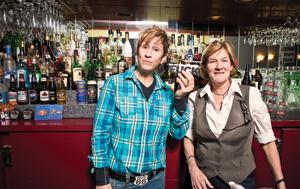It could not have been an easy business proposition — gastro-pub with a dedicated cabaret room with live acts every night of the week and an appeal that reaches the entire queer spectrum — but Heather MacKenzie and Maggie Cassella have accomplished just that with The Flying Beaver Pubaret. The Cabbagetown space — a pub-cum-cabaret — is about to celebrate its second anniversary and is going strong, with acts booked well into April and sold-out weekends, plus a growing reputation as a foodie destination.
“I was looking to program a cabaret-type space, where musicians can perform in a dedicated, relatively quiet bar space and not be just background to the conversation din. Heather was looking to open a new restaurant after [her former restaurant] Big Mamma’s Boy and found this place on Parliament that worked out perfectly as two things in one,” Cassella explains. Each has been complementing the other’s managerial duties ever since: while MacKenzie’s typical day involves shopping for fresh fish, meat and veggies for the kitchen, then opening the bar and (wo)manning it until closing time, Cassella’s starts at her home office, with bookings and a checklist to be completed for each show — website updates, mailing, flyer design, printing, ticket sales going online. Evenings, she too is at the pubaret.
She programs mainly based on her knowledge of the performer or the material but is open to unknown acts, too. “People usually just email me. What I would often have to ask first is if they think they can put 50 people in the room. If the answer is yes, I am happy to look at their stuff. We really want to make sure that the performers are well paid… The room needs to be full; we make our money on the food and beverage, and the performer makes the money on the door.”
MacKenzie was the original owner of Slack Alice’s on Church Street. (A bar that later opened in the same space, called Slack’s, is a well-known lesbian nightlife spot.) After it, she owned the Looking Glass, a bigger space on Church with an upstairs lounge for live performances. Still later she moved to Cabbagetown, where she opened Big Mamma’s Boy.
How did the lesbian bar culture change, from the first Slack Alice to today? “The gay community is spread out across the city now,” MacKenzie says. “If I opened Slack Alice now with that same concept that it had 20 years ago, I don’t think it would be as successful. There are so many private parties and so many bars across the city and events to go to every weekend, you rarely end up going to Church Street.”
Cassella agrees: “I came out 30 years ago, when there was this thing called the ‘dyke bar.’ It was my safe space. We occupied the basement of the men’s bar — this was in New Haven, Connecticut. The men were on the first floor, and we all danced together on the second floor. I went there every night. There were no circuit parties, no Cherry Bombs, no girls’ parties… can’t even keep track of them now.”
This growth and diversification abetted, in a way, the decline of the lesbian bar. Says MacKenzie, “I don’t think you can succeed today if you open a bar just for lesbians.”
“Or any one particular demographic,” Cassella adds. But what about the gay men’s bars? There are still many around. “Yes, there are many specialty bars — the Black Eagle, the bears, the leather, a whole different set of subcultures that I don’t think dykes have,” Cassella says. “Probably anecdotal evidence, but I think that guys go out more.”
“But the men I talk with tell me the bars have changed even for them,” MacKenzie responds. “Now, even if you go out, they’re all sitting around checking Grindr. People are giving up on bar interaction.”
Cassella used to co-own a dyke bar in the 1980s, while still living in the US, but had to close within six months. “I had no business. Then I took a different business partner who opened a jazz club catering to the African-American community, and we had a packed house every night. But I’d have circuit-type parties there every four or five weeks and I’d get 700 women. Still, this didn’t translate into a successful lesbian bar.” Women also have different preparing-to-go-out rituals not conducive to partying hard. “A lot of us would have a drink or two at home or at a friend’s place, and by the time we get to the bar, we have only one or two drinks and a short night left in us.”
The pubaret, of course, has lesbians who are regulars, and women come out in great numbers for some of the lesbian performers and comics (Karen Williams, for example, is a sure blockbuster). “I can’t tell you the amount of affinity I feel for them,” Cassella says. “They keep supporting us, and without making a big deal out of it, just by doing it. I appreciate them so much.” Although not great in numbers, the lesbian regulars are “what warms our hearts.” Both women also take great pride in the diverse, open vibe the pubaret has become known for. The guys, too, have shown great support and have expressed their love for what the two women are doing and how the pub is growing and evolving. “Everybody’s being themselves here, doing their thing; nobody ever looks out of place. That makes us very proud.”

 Why you can trust Xtra
Why you can trust Xtra


